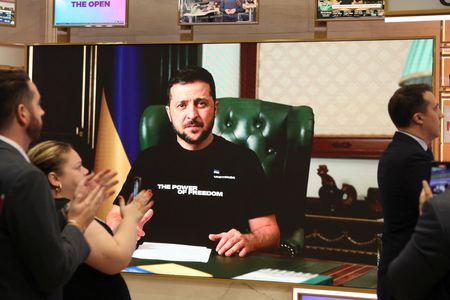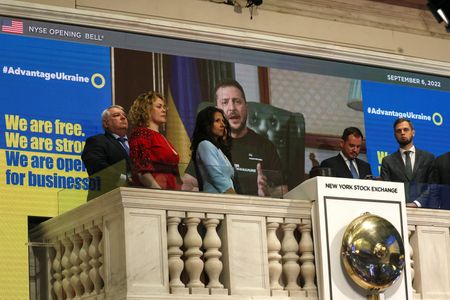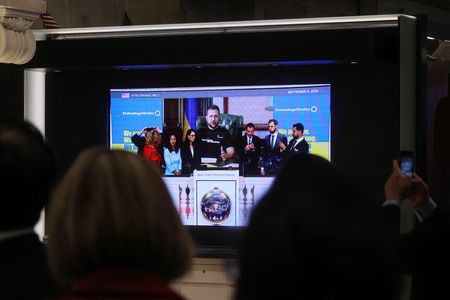 1
1 1
1



By Andrea Shalal
KYIV/NEW YORK (Reuters) – Ukraine’s President Volodymyr Zelenskiy remotely rang the opening bell at the New York Stock Exchange on Tuesday as his nation appealed for billions in private investment to rebuild factories and industries destroyed by Russia.
Zelenskiy’s government launched a platform of over 500 projects worth $400 billion for foreign investors to help rebuild Ukraine’s economy, even as war with Russia drags on.
Zelenskiy appeared on a video screen behind the platform overlooking the NYSE floor where the opening bell is traditionally rung. Traders applauded and whooped while a banner read: “We are free. We are strong. We are open for business.”
Fresh from a roundtable with top executives from JP Morgan, Pfizer Inc and other U.S. companies, Zelenskiy said in English that Ukraine was already rebuilding its economy, more than six months since the Russian invasion.
“Ukraine is the story of a future victory and a chance for you to invest now in projects worth hundreds of billions of dollars to share the victory with us,” he said.
The United States and allies in Europe and Asia have already sent billions in aid, weapons and other security spending.
The “Advantage Ukraine” initiative – first flagged at a recovery conference in Switzerland in July – focuses on 10 key sectors, including the military-industrial complex, energy, pharmaceuticals, metallurgy, woodworking, and logistics.
‘INVEST NOW’
“It is necessary to invest in Ukraine now, and not wait for the end of the war,” Economy Minister Yulia Svyrydenko said in a statement.
Advertising group WPP is leading the marketing campaign for the initiative.
Ukraine is also appealing for some $5 billion in international aid each month to keep its economy running, in addition to military aid from NATO alliance members.
Svyrydenko told Reuters last month that Ukraine’s economy should stabilise over the coming year and expand by as much as 15.5% in 2023, after a likely contraction of 30-35% this year.
On Tuesday, she said Ukraine was keen to bring back foreign direct investment, which had reached $6.7 billion before the war. “The Russian invasion adjusted our short-term plans, but did not force us to abandon our strategic goals,” she said.
After registering on the platform, potential investors will receive information about opportunities.
The economy ministry said it was providing grants to existing businesses, and has already helped relocate 700 businesses from the frontlines of the conflict, of which 480 had already resumed work.
(Reporting by Andrea Shalal, additional reporting by Conor Humphries in Dublin, writing by Karin Strohecker; Editing by Andrew Cawthorne)